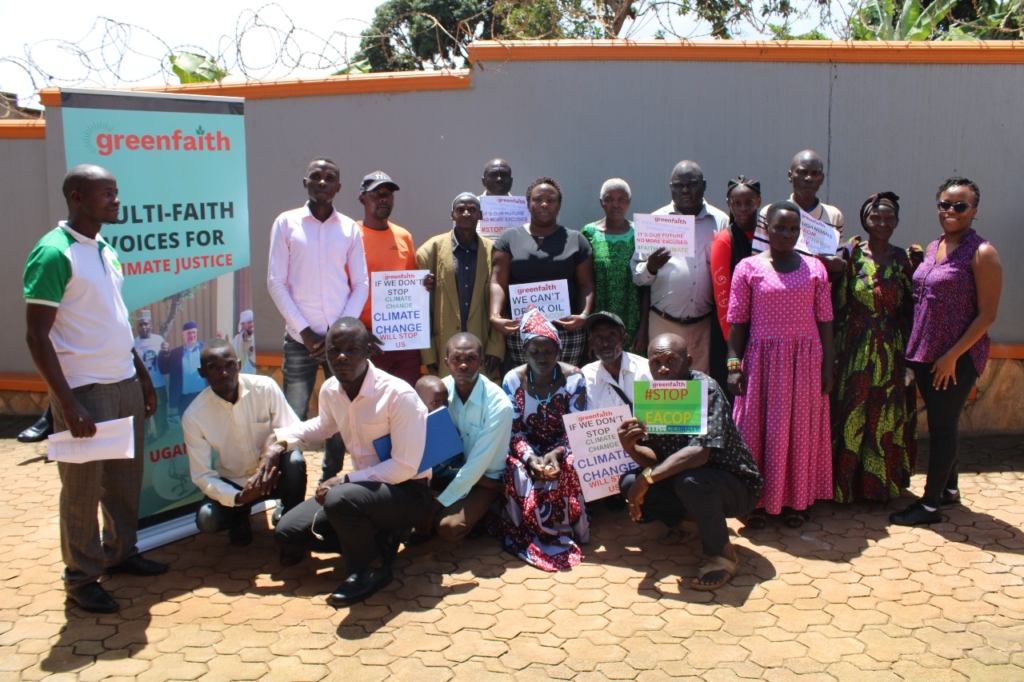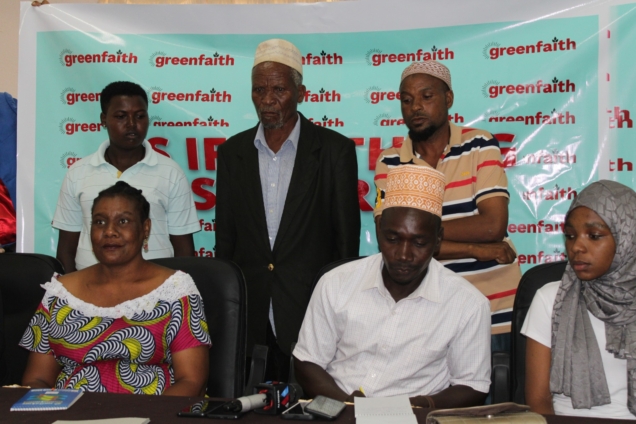The international multi-faith climate justice organization, GreenFaith, has accused East Africa Crude Oil Pipeline (EACOP) in its report implicating the company in the disturbance and potential desecration of over 2,000 graves along the construction route of the controversial EACOP project.
The report, named "As If Nothing Is Sacred," allegedly exposes TotalEnergies for routinely ignoring the impassioned pleas of local families to honour these sacred sites, disregarding information shared by families or community members about the locations of unmarked graves, and providing inadequate, delayed, or no compensation for the harm inflicted.
The report said, this disregard has left family members and local communities grappling with profound emotional and spiritual trauma, underscoring the company's lack of compassion.

It also stated that, religious leaders from Tanzania and Uganda, the two nations directly affected by EACOP's proposed route, are demanding an immediate halt to the project in response to the report's harrowing findings.
The report emphasized the anguish endured by local communities, stating, "Local communities told us that TotalEnergies has, on numerous occasions, disturbed or disrespected the graves of their families and ancestors. This has taken place despite countless efforts by local people to alert TotalEnergies to the presence of the graves and about their concerns." It further notes that the company has disregarded or violated international standards for the reburial of human remains.
GreenFaith's research for the report incorporated public documents and information gathered through field research. The organization conducted comprehensive reviews of information published about the EACOP and Tilenga projects and their associated impacts. Additionally, it said field surveys were conducted in three districts in Tanzania and six districts in Uganda, with interviews held with members of affected families who own graves along the pipeline routes.
According to the report, the desecration of graves has inflicted deep spiritual and psychological wounds on families residing along the construction route. One interviewee recounted the horrors endured, revealing that the coffins provided were too small for the deceased, forcing the deceased's body to be dismembered to fit.
GreenFaith's Global Organizing Director, Meryne Warah, commented, "It is traumatizing enough that TotalEnergies, supported by the governments of Uganda and Tanzania, has already displaced thousands of families along the proposed pipeline's route. But the finding that even the dead cannot rest in peace is disrespecting something deeply sacred to Africans."

For over two years, GreenFaith has been urging the immediate abandonment of the EACOP and Tilenga projects. In response to the recent report, GreenFaith is calling on TotalEnergies to take several key actions: Reimburse local communities for financial losses incurred due to inadequate project provisions. Address unresolved religious or cultural needs, bridging the gap between activities to date and international best practices.
It also wants relocation of graves that have been repeatedly claimed by affected community members and families but remain in the project's path. Ensure that relocated graves with structural flaws or those left unfinished meet the standard expected for a project of this magnitude.
EACOP Refutes Claims, Citing Lack of Basic Fact-Checking
Following the release of the report on November 9, 2023, EACOP has rejected the allegations contained in the report. East African Crude Oil Pipeline project is developed by EACOP Ltd (“EACOP”), a company which shareholders are TotalEnergies, China National Offshore Oil Corporation (CNOOC), the Uganda National Oil Company (UNOC) and the Tanzania Petroleum Development Corporation (TPDC) said, the company has full responsibility for the land acquisition process, which is carried out on behalf of the respective States, in both Uganda and Tanzania.
Managing Director Martin Tiffen, states that EACOP follows international best practices, including thorough consultation and engagement in grave relocations.
Responding to GreenFaith, Tiffen expresses regret over the lack of consultation before the report's publication and questions the accuracy of grave relocation and displacement claims. EACOP challenges GreenFaith to provide specific cases of grievances, pledging a full investigation and resolution.
Graves Relocation in EACOP Land Acquisition
According to Mr Tiffen, EACOP has engaged in thorough consultations to identify the cultural rites relevant to each family, community, or tribe involved in the grave relocation process. He emphasizes the importance of understanding the cultural and religious specificities of each household, community, or tribe before initiating any relocation activities.
“As part of the land acquisition preparation, EACOP has identified cultural heritage, including graves, but also shrines and other items of cultural significance such as spiritual sites, places of worship or archaeology, in accordance with IFC Performance Standard on cultural heritage. Route selection design took these cultural heritage factors into consideration and avoidance of burial sites was implemented to the extent possible in compliance with IFC Performance Standard,” Mr Tiffen said.
Mr Tiffen further clarified that during the land and asset survey, families or grave owners reported both marked and unmarked graves. The Project documented these locations, designating grave owners as Project Affected Persons (PAPs) regardless of land or property ownership.
According to him, compensation for the relocation of graves is determined based on agreed-upon values with the chief valuer, and EACOP covers the costs associated with the relocation.
“Cultural Heritage experts consulted with PAPs to verify unmarked graves. After identification, the relocation of graves is carried out as the grave owners are consulted as to whether they wish to relocate the graves themselves, or if they require EACOP to relocate the grave on their behalf at no cost to them. In almost all cases in Uganda and in all cases in Tanzania, grave owners elected for EACOP to do these relocations.
Religious services and rituals at the original grave location and at the new burial site chosen by the grave owner take place according to the local tradition. Respect for all different religions or spiritual beliefs is demonstrated. This is outlined in a scoping form, signed off by the PAP, as an acknowledgement of receipt of funds to support purchases of goods and services for such ceremonies.
Relocation takes place at the time and day of the grave owners wishes (some take place at night).
The District Medical Officer is the custodian of the process. The remains are treated with the utmost respect and buried with a new coffin and placed in a marked grave. Exhumation and reburial are done by professional companies who also engage workers from the community.
Most relocations were done to land belonging to and agreed with the PAPs. In some cases where PAPs had insufficient land, EACOP acquired a plot on the PAP’s behalf for reburial. For certain deceased notables or spiritual leaders, additional and special ceremonies take place which are supported by EACOP. When the process is completed, PAPs signed off that they were satisfied with the final relocation, and these individual forms are retained as part of record keeping.”
Mr Tiffen details EACOP's approach to graves relocation, emphasising adherence to cultural heritage standards. The company identifies and compensates grave owners, consulting on relocations. Religious services and rituals are conducted according to local tradition. EACOP reports identifying 656 graves in Uganda and 1,124 in Tanzania, with 97% relocated to date.
“…EACOP also maintains a non-judicial Grievance Mechanism. Whilst some grievances have been raised and closed identifying additional graves since the initial surveys, there are no grievances recorded relating to the relocation process itself.”
GreenFaith maintains that EACOP, a proposed 1,443-kilometer oil pipeline, has numerous negative consequences, including grave violations. The project is accused of displacing over 100,000 people, causing environmental damage, and jeopardizing water supplies for three million East Africans.
Latest Stories
-
KPMG report exonerates us – SML
31 mins -
Works and Housing Ministry seeks lasting solutions to challenges with stakeholders engagement
40 mins -
President’s statement on GRA-SML contract underlines Fourth Estate’s revelation – MFWA
44 mins -
Director urges parents to protect children from abuse
1 hour -
Imani-Ghana criticises Akufo-Addo for not lauding Fourth Estate’s contribution to social development
1 hour -
Man remanded for allegedly stabbing businessman with broken bottle and screwdriver
2 hours -
Population in Kumasi Central Prison surges to 1800, threefold exceeding capacity
2 hours -
NPP to conduct La Dadekotopon parliamentary primary today
2 hours -
KPMG’s report on GRA and SML deal, government white paper on report and matters arising
2 hours -
I won’t reply to Chris Brown tour criticism – Ayra Star
2 hours -
British Columbia to back off drug decriminalisation project
2 hours -
Veteran commentator Joe Lartey Sr dies at 96
2 hours -
Livestream: Newsfile discusses KPMG report on SML deal, ILO on SSNIT reserves and NDC’s running mate
3 hours -
Ghanaian activist hugs over 1,100 trees in an hour to set Guinness World Records
3 hours -
Mathew Anim Cudjoe’s Dundee United promoted to Scottish Premiership after Championship win
3 hours

